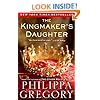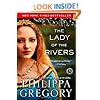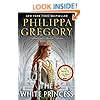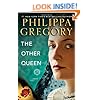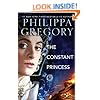




The White Queen (The Cousins' War) Paperback – July 9, 2013
| Amazon Price | New from | Used from |
|
Hardcover, Deckle Edge
"Please retry"
|
$4.17 | $0.01 |
|
Mass Market Paperback
"Please retry"
|
—
|
$4.68 | $2.85 |
|
Audio CD, Abridged, Audiobook
"Please retry"
|
$8.73 | $9.07 |
|
Unknown Binding
"Please retry"
|
—
|
$4.71 | $4.71 |

Don't have a Kindle? Get your Kindle here, or download a FREE Kindle Reading App.
Want to know our Editors' picks for the best books of the month? Browse Best Books of the Month, featuring our favorite new books in more than a dozen categories.
Product Details
Would you like to update product info or give feedback on images?.
|
Editorial Reviews
Amazon.com Review
THE COUSINS' WAR
Book One
Philippa Gregory, "the queen of royal fiction,"*
presents the first of a new series set amid the
deadly feuds of England known as the
Wars of the Roses.
Brother turns on brother to win the ultimate prize, the throne of England, in this dazzling account of the wars of the Plantagenets. They are the claimants and kings who ruled England before the Tudors, and now Philippa Gregory brings them to life through the dramatic and intimate stories of the secret players: the indomitable women, starting with Elizabeth Woodville, the White Queen.
The White Queen tells the story of a woman of extraordinary beauty and ambition who, catching the eye of the newly crowned boy king, marries him in secret and ascends to royalty. While Elizabeth rises to the demands of her exalted position and fights for the success of her family, her two sons become central figures in a mystery that has confounded historians for centuries: the missing princes in the Tower of London whose fate is still unknown. From her uniquely qualified perspective, Philippa Gregory explores this most famous unsolved mystery of English history, informed by impeccable research and framed by her inimitable storytelling skills.
A Conversation with Philippa Gregory

Q: For readers who love your books set in Tudor England, what would you like them to know about the Plantagenets and the House of York?
A: I suppose I'd like them to know that here is a family just as fascinating as the Tudors, perhaps more so. Certainly, they are more complicated, more wicked, and more passionate--takers of great risk. I think people have been put off this period because it has been so well studied by military historians that it has been regarded as being just about battles. But there is so much more to it than this! The history of the women of the period has been very neglected because of this emphasis on battles and thus the male leaders.
Q: What appealed to you about using Elizabeth Woodville as the main character in a novel? In what ways do you think modern women can identify with Elizabeth?
A: The things I discovered about Elizabeth in the first days of my reading about this period told me at once that she would fascinate me, and she has done so. Her background as a descendant of a family who claim to be related to a goddess was enough to have me absolutely enchanted straightaway. It is in the historical record that her mother was widely believed to be a witch, and that charge was leveled at Elizabeth also. This is exciting enough, but it also indicates that people were afraid of Elizabeth's power, and I am interested in powerful women. I think she will fascinate modern women in the same way that many historical women strike a chord: despite so many changes in the world, women are still trying to find happiness, manage their children, seek advantage, and avoid the persecution of misogynists. As women of any time, we have a lot in common. Despite the amazing advances in the rights of women (and I am so grateful for these myself), the struggle for women's freedom, independence, and the right to exercise power goes on.
Q: Throughout the novel there are scenes relating the story of the goddess Melusina. Is this based on an actual historical fable, or is it something you created for the novel?
A: The fable of Melusina is well known, perhaps to everyone, in its retelling as the story of the Little Mermaid by Hans Christian Andersen and then in the Disney movie. As I say at the beginning of the novel, the legend of Melusina goes far back in time, perhaps to the classical legends, perhaps even earlier. The fable was studied by Carl Jung; Melusina has been identified as a form of the material of the world--the dark, watery element that combines with the sun in the alchemist's “chemical wedding.” This is a potent myth, indeed, and I retell the story here in a way that speaks to my characters and to me.
Q: “These are not chivalrous times; these are not the times of knights in the dark forest and beautiful ladies in moonlit fountains and promises of love that will be ballads, sung forever” (page 22), you write in The White Queen. Is there a tendency to romanticize history, both for writers and readers? How do you make sure to realistically portray all aspects of the time period you're depicting, even the more difficult ones?
A: Yes, indeed. These are not chivalrous times. I suspect that no times have ever been chivalrous times. We glamorize the past, and we romanticize it; we even look back at our own personal histories and cast a rosy glow or an enhanced dark shadow over our own childhoods. I keep my writing grounded in realism by reading a great deal before I start writing, by looking at the record with a critical eye, and by being skeptical of grandiose claims. Having said that, I too find it hard to resist the charm of Edward or Elizabeth or the marvelous character Jacquetta or any of the other powerful and interesting people who strove for themselves and for their families in these dangerous times. These are not chivalrous or romantic times, but they are times of danger--and in such circumstances one sees both the worst and best in people.
Q: What challenges, if any, did you face when writing about the battle scenes and the military strategy, which was often a crucial factor in determining who took the throne? Did you visit any of the places where the battles took place?
A: I became a researcher in military history, which is not my natural home! I visited battle sites and I read long and complicated descriptions of battles and the modern speculations. In the end I found myself absolutely intrigued and fascinated by how the battles were lost and won by small events, even sometimes by luck. The mist at Barnet is a recorded fact, and it was possible for me to weave it into the story of Elizabeth and her mother as well as to see it as a determining factor on the battlefield. The three suns of Towton were both a real phenomenon and a powerful metaphor for the troops. The history of battles is a central part to the story of the Cousins' War, and part of my task in this novel and the others in the series was to take this history, as I take any other, and make it come alive in the novel.
Q: The fate of Edward and Richard, the princes in the Tower, is a subject that has confounded historians for centuries. Why did you decide to approach this aspect of the story the way you did? Is there evidence to suggest that Elizabeth sent her son Richard into hiding and a page boy in his place to the Tower?
A: Part of my response to this story was simply emotional: I have a son of my own, and the thought of Elizabeth losing both her sons was tremendously painful. So I confess a bias to wanting at least one to survive. Then there is the historical evidence. A very interesting book by Ann Wroe, Perkin, suggested to me that the so-called pretender Perkin Warbeck might well have been the surviving prince, Richard. Her case for it is very compelling, as others have suggested too. There is other persuasive evidence that both boys were not killed as the traditional history (and Shakespeare) suggests. Even the traditional history--of them being suffocated in their beds in the Tower and buried beneath a stair--is filled with contradictions. If Perkin was Richard--and this is speculative history, as indeed all history around this genuine mystery must be--then Richard must have somehow survived. How could this have happened? It seemed to me most likely, not that he escaped from the Tower, but that he was never sent to it. His mother knew the danger her older son was in, had herself seen Henry VI murdered in the Tower, and was highly aware of the danger to her sons. It seemed to me most unlikely that she would hand over a second son when she had lost the first. The changeling page boy is my invention, but the history of Perkin in Flanders is based on his own confession. His story will continue in the series.
Q: Elizabeth's father says to her, “We are forming a new royal family. We have to be more royal than royalty itself or nobody will believe us. I can't say I quite believe it myself” (page 63). How unlikely was it that Elizabeth Woodville would become queen? How has she been remembered by historians?
A: Elizabeth's ascent to the throne is one of the great triumphs of a commoner and was considered so exceptional in her own time that one of the explanations offered was witchcraft. It is really a triumph of unlikely events. How unlikely that Edward, raising troops for a battle, would be diverted by a woman he must have met by chance? How unlikely that he would offer marriage when he knew as well as Warwick that to secure his reign he must marry well, preferably a European princess? How unlikely that even after a secret marriage he would honor his vows? It is a catalogue of unlikely events, and the only coherent explanation is that Edward and Elizabeth fell in love at first sight and married for love. Elizabeth, like many powerful and effective women, has been unkindly treated by historians. Some follow the gossip against her at the time that begrudged her good fortune; some point to the alliances she made for her family as symptoms of greed and self-aggrandizement. She gets little credit for surviving two periods in sanctuary, nor for her courage during the siege of the Tower. She is like many women “hidden from history” in the phrase of historian Sheila Rowbotham, and when her role is acknowledged she is often treated with very harsh criticism.
Q: Anthony Woodville, the queen's brother, seemed to be ahead of his time in regard to education and culture. What more can you tell us about him? Was Elizabeth honoring his memory by becoming a patroness of Queens' College Cambridge?
A: Elizabeth took over the role of patron of Queens' College from her predecessor Margaret of Anjou, but her interest in education and culture may have been inspired and would certainly have been encouraged by her brother, who was a true Renaissance man: spiritual, martial, thoughtful, and innovative. He brought the printer William Caxton to England and sponsored the first printed book; he was famous for his ability in the joust; and he was a loyal brother to Elizabeth and a devoted uncle to her son. The poem I quote in the book was indeed the poem he wrote the night before he died. We can only speculate as to the sort of man he can have been that he should spend his last hours on earth, not in rage or grief, but in crafting a poem of such detachment and clarity.
Q: If you could go back in time and live in any of the royal courts you've written about, which one would it be and why?
A: I would be absolutely mad to want to be a woman of any of these times. A Tudor or Plantagenet woman was wholly ruled by men: either father or husband. She would find it difficult to seek any education, make her own fortune, or improve her circumstances. Her husband would have a legal right over her that was equal to his ownership of domestic animals; and the chances of dying in childbirth were very high. If one could go back in time and be a wealthy man, these would be times of adventure and opportunity but still tremendously dangerous. I think I would prefer the Tudor period to diminish the danger of being killed in battle, but there were still regular plagues and foreign wars to face. I cannot sufficiently express my enthusiasm for modern medicine, votes for women, and safe contraception.
Q: The younger Elizabeth emerges as quite a vivid and spirited character. Will we be seeing more of her in a future book?
A: Elizabeth, the Princess of York, goes on to marry Henry VII and so is mother to a royal dynasty, just as her father and mother hoped they were creating a royal dynasty. She is, of course, mother of Henry VIII, and her granddaughter is England's greatest queen--Elizabeth I. Elizabeth of York will be the subject of the third book of this series, to be called The White Princess. But coming next is the story of the mother of Henry VII, the indomitable Margaret Beaufort, whom you may have glimpsed in this novel but who deserves a book all to herself. It is called The Red Queen.
--This text refers to the Hardcover edition.
From Publishers Weekly
Copyright © Reed Business Information, a division of Reed Elsevier Inc. All rights reserved. --This text refers to the Hardcover edition.
More About the Author
Philippa obtained a BA degree in history at the University of Sussex in Brighton and a PhD at Edinburgh University in 18th-century literature. Her first novel, Wideacre, was written as she completed her PhD and became an instant world wide bestseller. On its publication, she became a full-time writer, and now lives with her family on a small farm in the North of England.
Her knowledge of gothic 18th century novels led to Philippa writing Wideacre, which was followed by a haunting sequel, The Favoured Child, and the delightful happy ending of the trilogy: Meridon. This novel was listed in Feminist Book Fortnight and for the Romantic Novel of the Year at the same time - one of the many instances of Philippa's work appealing to very different readers.
The trilogy was followed by The Wise Woman, a dazzling, disturbing novel of dark powers and desires set against the rich tapestry of the Reformation, and by Fallen Skies, an evocative realistic story set after the First World War. Her novel A Respectable Trade took her back to the 18th century where her knowledge of the slave trade and her home town of Bristol produced a haunting novel of slave trading and its terrible human cost. This is the only modern novel to explore the tragedies of slavery in England itself, and features a group of kidnapped African people trying to find their freedom in the elegant houses of 18th century Clifton. Gregory adapted her book for a highly acclaimed BBC television production which won the prize for drama from the Commission for Racial Equality and was shortlisted for a BAFTA for the screenplay.
Next came two of Gregory's best-loved novels, Earthly Joys and Virgin Earth, based on the true-life story of father and son John Tradescant working in the upheaval of the English Civil War. In these works Gregory pioneered the genre which has become her own: fictional biography, the true story of a real person brought to life with painstaking research and passionate verve.
The flowering of this new style was undoubtedly The Other Boleyn Girl, a runaway best-seller which stormed the US market and then went worldwide telling the story of the little-known sister to Anne Boleyn. Now published in 26 countries with more than a million copies in print in the US alone, this is becoming a classic historical novel, winning the Parker Pen Novel of the Year award 2002, and the Romantic Times fictional biography award. The Other Boleyn Girl was adapted for the BBC as a single television drama and a film is now in production starring Scarlett Johansson as Mary Boleyn, Natalie Portman as Anne Boleyn and Eric Bana as Henry VIII.
A regular contributor to newspapers and magazines, with short stories, features and reviews, Philippa is also a frequent broadcaster and a regular contestant on Round Britain Quiz for BBC Radio 4 and the Tudor expert for Channel 4's Time Team.
She lives in the North of England with her husband and two children and in addition to interests that include riding, walking, skiing and gardening (an interest born from research into the Tradescant family for her novel, Virgin Earth), she also runs a small charity building wells in school gardens in The Gambia. Fifty-six wells have been built by UK donors to date.
Customer Reviews
Most Helpful Customer Reviews
THE WHITE QUEEN is the first book in The Cousins' War Series. You can't see me, but I'm doing a little happy dance because that means there will be two more books about the Plantagenets -- THE RED QUEEN and THE WHITE PRINCESS. I am already excited about the release of the next book because I felt as if I was kind of left hanging at the end of THE WHITE QUEEN. I don't mean that in a negative way and I'm sure it was the author's intent, but I want to know what happens next!
While I definitely enjoy historical fiction, I am sadly lacking in knowledge about England and its Monarchy. As a result, I knew almost nothing about the Plantagenets except for a few small things that appeared as side stories in other novels. I can't tell you how much of this story is fact versus fiction; and frankly, I don't even care. I was fascinated by the story Ms. Gregory told about these characters' lives. THE WHITE QUEEN is better than any televised drama or movie I've ever seen. These characters are smart, determined, and ruthless; and I just loved reading about them.
I thought THE WHITE QUEEN had a little bit of everything; and I'm sure there is something in Elizabeth Woodville' s story that will capture your attention. First, THE WHITE QUEEN is just a fabulous historical story about the Cousins' War.Read more ›
I have mixed feelings about this book.
Here's what I didn't like so much:
--The fact that the book is written in the present tense. Gregory started writing this way sometime around The Boleyn Inheritance, and it gets on my nerves sometimes because I feel that using the present tense for historical fiction is so limiting.
--The water imagery got to be a bit much-too-much at times. It was beautiful at first, but the fact that Elizabeth kept talking about her ancestress, the water goddess/nymph Melusina, began to get tired after a while.
--Although Gregory is great in general at describing the events of the time periods of which she writes, she's not so good as describing how people actually lived--as with her previous novels, there's very little about what her characters wear, eat, or do in their free time. It's the little bits and pieces that make characters come to life, make them three-dimensional.
--Reading Sharon Kay Penman has seemingly made me pro-Richard III for life, so I was a little disappointed by Gregory's vilification of him in the book (though of course, when the story is told from the point of view of Elizabeth Woodville, of course Richard would be portrayed in a negative light).
--About halfway through the book, Gregory switches from 1st person POV to 3rd, in order to talk about some of the decisive battles of the Wars.Read more ›
I have two chief complaints about the novel: one I recall feeling while reading "The Other Boleyn Girl," and the other I do not. The first complaint is her repetition. I realize that some authors use this as a literary device, but some facts I felt she repeated way more often than was necessary. Melusina this and locket that. They were important bits of the story, but she could have let us remember them on our own sometimes. The other complaint is that, at times, I felt the book read a little like non-fiction, just a recounting of the events from one character's point of view, and not as much a novel.
Without spoiling anything, I'll just say that it's interesting what she does with the "Princes in the Tower," and the end is abrupt and somewhat unsatisfying (for a person who knows the history).
Overall, however, I enjoyed reading the book and I liked delving into the Plantagenet dynasty. It has inspired me to pick up other books on the period, and I look forward to her next one.
It's a tumultuous period in English history and Gregory struggles to incorporate all the events. At times she needs to resort to writing in the third person rather than Elizabeth's narrative, at others she skips years at a time. The early section in particular blends into one long war montage that becomes confusing. It doesn't help also that so many key players have the same name (George, Richard, Margaret). There is a family tree at the beginning of the book but it is incomplete and somewhat unclear (unless Henry VI married Edmund Tudor?)
With so much going on, the book becomes too plot driven and character development is secondary. For example, at the beginning of the book Elizabeth and Edward meet, fall immediately in love and marry secretly. The problem is that you don't ever feel like you're reading a love story. We don't know much about Elizabeth (she's widowed, but we never get any sense of what her relationship with her first husband was like), nor what she sees in the King. It feels like they get married only because that's what actually happened, rather than because of who the characters were and how they felt.
Throughout the book, the characters are all one dimensional and can all be pigeon-holed in a word (think "scheming" or "unhinged" or "placid"). None of them, not even Elizabeth, have the complexity that real people have - especially if you consider that the book takes place over 20 years.Read more ›

